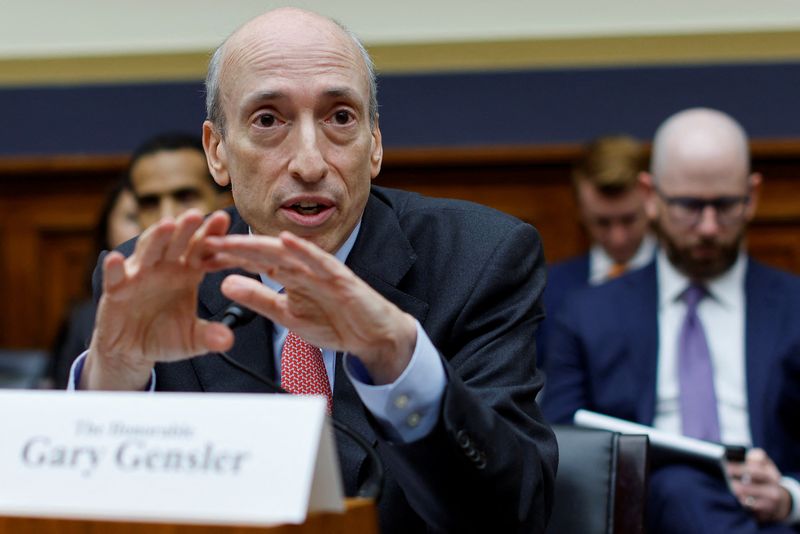US SEC chief Gensler to step down in January when Trump takes over
By Douglas Gillison
WASHINGTON (Reuters) - U.S. Securities and Exchange Commission Chair Gary Gensler will step down on Jan. 20 when President-elect Donald Trump's administration takes over, the agency said on Thursday, ending an ambitious tenure that saw him clash with Wall Street and the crypto industry.
"I thank President Biden for entrusting me with this incredible responsibility. The SEC has met our mission and enforced the law without fear or favor," Gensler, who was nominated by Democratic President Joe Biden in 2021, said in a statement.
Known for his hard-charging style, Gensler led an ambitious agenda to boost transparency, reduce systemic risks, and stamp out conflicts of interest on Wall Street, completing dozens of new rules, some of which have been challenged in court.
Among his major accomplishments were changes to increase the resilience and efficiency of U.S. markets, including speeding up trade settlements and overhauling the $28 trillion Treasuries market, as well as a number of rules boosting investor disclosures and corporate governance.
The Baltimore native also successfully implemented rules mandated by Congress imposing SEC oversight on auditors of U.S.-listed Chinese companies, ending a decade-long tussle with Beijing that lawmakers said had put U.S. investors at risk.
On the enforcement front, Gensler's SEC broke new ground with a multi-year effort focused on Wall Street's use of text, WhatsApp and other unauthorized channels to discuss business, levying more than $2 billion in fines against dozens of firms, including JP Morgan and Goldman Sachs.
He also took on the crypto industry, suing Coinbase (NASDAQ:COIN ), Kraken, Binance and others, alleging that their failure to register with the agency violated SEC rules, accusations the companies deny and are fighting in court. When it comes to crypto, the courts have mostly backed Gensler's positions.
But his sweeping agenda and uncompromising posture sparked intense pushback from Wall Street, as well as congressional Republicans, and even some Democrats.
The U.S. Chamber of Commerce, Managed Funds Association and other groups sued in the conservative-leaning Fifth U.S. Circuit Court of Appeals and elsewhere to overturn at least eight rules, arguing they were unjustified, harmful or beyond the SEC's authority.
Jill Fisch, a University of Pennsylvania law professor specializing in securities regulation, said Gensler would depart with a mixed legacy.
"I think there are clearly some victories, but I would say he came in with a fairly aggressive rule-making agenda and most of that either hasn't or isn't likely to endure."
TRUMP TRANSITION
In a major blow to the agency, the Fifth Circuit ruled in June that the SEC did not have the authority to oversee the $27 trillion private funds industry. That loss, and other legal challenges, have slowed the agency's rule-making this year, and could impede the agency in the long run, Reuters reported.
Just before Gensler's announcement on Thursday, a federal judge in Texas struck down the SEC's overhaul of Treasury dealer rules adopted earlier this year.
Some critics also say Gensler's crypto crusade was ill-conceived and damaged the U.S. economy by stifling innovation and pushing crypto companies offshore, criticism he has rejected. In a speech this month, he argued history has shown that "robust securities regulation both creates trust in markets and fosters innovation."
Trump has not said who would replace Gensler, although he is widely expected to appoint one of the current Republican SEC commissioners, Hester Peirce or Mark Uyeda, as acting head of the agency.
Reuters previously reported that Trump's transition team is considering former SEC officials for the job permanently.
Gensler's successor is expected to immediately end the crypto crackdown, review many of Gensler's rules, pull enforcement actions wending their way through the courts, and pursue rule changes focusing on promoting capital formation.
Source: Investing.com
